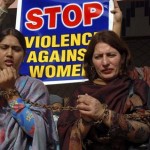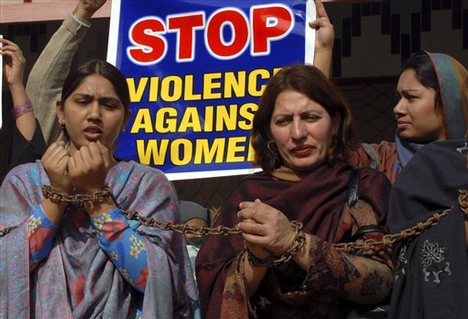
Whether this show of unity on a matter concerning women should be interpreted as an act of chivalry or a demonstration of ‘woman power’, it will be widely welcomed. One must, however, admit that it was the clout of the women’s caucus and the determination of the speaker — also a woman — to get the treasury and opposition benches to forge a consensus that ultimately carried the day. The bill is expected to have a smooth sailing in the Senate.
This certainly has been an uphill struggle. When the commission was set up in July 2000, it was widely felt that its mandate was too weak to allow it to function as an effective body. This view was confirmed in July 2001 when Aurat Foundation and Shirkat Gah organised an international conference where representatives from abroad briefed the participants about the powers wielded by similar bodies in their countries.
It became increasingly clear that the announcement made with great fanfare by Gen Musharraf was no more than a gimmick.
The National Commission on the Status of Women (NSCW) lacked the capacity to bring about the emancipation of women and the elimination of discrimination against them.
Hence it was demanded that the powers and independence of the women’s commission should be enhanced to optimise its performance. The participants of the Islamabad conference also called for greater transparency and accountability in the commission’s selection and working.
It took more than a decade and a lot of hard work and advocacy to get the government to consider a change in the status quo.
The new body with the simple nomenclature of the National Commission for Women will certainly have more teeth in some respects as compared to its predecessor. It will be autonomous with the power to raise its own finances. Its composition will be more representative. Thus a bipartisan parliamentary committee will give a list of nominees from which the prime minister will select the members.
The prime minister will appoint the chairperson with the agreement of the leader of the opposition. This would hopefully ensure that the working of the commission is not hamstrung by inter-party conflict. Autonomy should allow the commission to bypass the red tape of bureaucracy and proceed to take up issues it feels are urgent.
The bill adopted by the National Assembly is significant in another way. The commission has been empowered to take up complaints of violations of women’s rights and even hold an enquiry into the matter if it is not being attended to. It can also inspect jails to check on female prisoners. In effect it will have the powers of a civil court. The ordinance of 2000 did not grant this power to the NCSW which could only monitor such violations and individual grievances, and then undertake initiatives for better management of justice and social services through the concerned forums.
In respect of the commission’s power of reviewing and monitoring the laws, policies and programmes of the government in the light of their implications for gender equality, empowerment of women, political participation and representation, the new law upholds the provision of the previous ordinance. It can also recommend repeal, amendment or new legislation as its predecessor could do. As before, it is authorised to sponsor research and maintain a database on gender issues as well as recommend the signing or ratification of international instruments.
The catch in all these provisions is that the commission can only make recommendations. It has no power to enforce its own views. When Justice Majida Razvi was the chairperson of the NCSW she had the Hudood Ordinances reviewed and the commission very strongly recommended their repeal. Her appeal fell on deaf ears. It was only later that the injustice inflicted on women by the Hudood Ordinances was neutralised by adopting the Women’s Protection Law of 2006. Will an autonomous commission have more powers of implementation? Most unlikely.
India’s National Commission for Women has been described as a strong body and yet one of its former members, Syeda Hameed, writes in her book They Hang, “The stories I tell are, of course, stories of women abused and violated by men wielding brute power. But they are also about the National Commission for Women, the nation’s apex body for women vested with the power to summon the highest functionaries of the land and seek redress — yet it remains ineffective for the most part … Perhaps it was ignorable or ignorance combined with indifference, but the truth of the matter is that the commission’s reports and jurisdiction are not binding on anyone, and its jurisdiction stops at its front door.”
Our commission can expect no better treatment from the male-dominated administration. But there is still hope. If the chairperson is an active and experienced person as the incumbent (Anis Haroon) is, she can use her office to draw public attention to the issue that needs to be addressed.
Working in close liaison with women parliamentarians the National Commission for Women can make an impact on the laws.
In other words the battle has to go on. But every victory helps create greater awareness and should be used in the campaign to mobilise women at the grass-roots. That is where lies the strength of the women’s movement wherever it may be.
Reprinted from Zubeidamustafa.com


I think the bigger question is Why do women need protection? If fathers teach their sons to be real men and to treat women with respect, women wouldn’t need protection. Of course, it’s every man and woman’s responsibility to protect the weak. It’s not just a gender issue, it’s a human one.